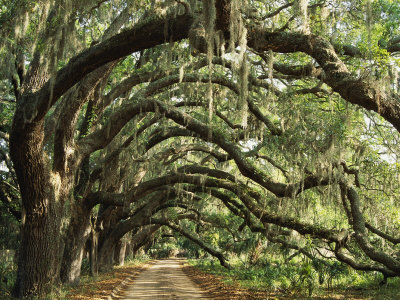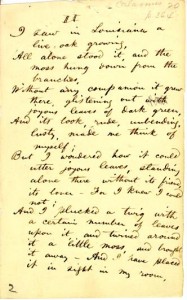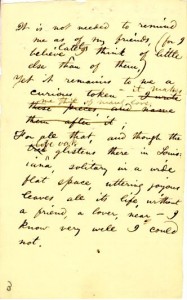I, too, sing America.
These words struck a chord in me that I had been waiting to hear since we started this class. I have become enamored, some might say obsessed, with Whitman over the course of this semester. He has become to me, a man beyond others, he is the voice of America, the voice of the city, the voice of the people, the voice of war, and pain, and suffering, and love. The voice of Life and the voice of Death. As I’ve studied his works I’ve come to believe that I knew him, that he spoke to me, but this whole time I knew, Whitman did not know me, we had never met, and we never will. Once we began the deathbed edition I had to face this realization in a way which I had been avoiding. Whitman is dead, his body, that rugged, tan-faced, bearded body, is gone.
This realization came with a sense of loss. How can the world survive without this Great American Poet. How will we persevere in the face of destruction without this man sitting by our bedside, writing letters and serving us ice cream? All I could think was that Whitman was gone and all we had left was his voice, that powerful, gentle voice, echoing through the corridors of time, entreating us to listen.
Then I read Langston Hughes poem, and I realized, the man was more than the man, he was an idea, he was a belief, his voice was more than just the interplay of vocal chords and air, it was a way of speaking, a type of oration which had been unspoken until Whitman appeared. And this idea, this style, has not been lost. Poems, paintings, dances, novels; Whitman can be found in all of these.
Hughes writes that he can sing America, because the song continues, it only needs a conduit through which to be voiced. Whitman was the first to hear this song and he sang it all his life. From his 1855 “Song of Myself” to “So Long!” Whitman sang the song of America in a way which it had not been sung before. All of the poets we read for this week heard that same song. It could be argued that they would have heard this song without Whitman. Perhaps another poet would have taken up the call, but none of them would have done this the way in which Whitman did. I won’t argue that Whitman’s way was the only and best, there’s no way to know how another would have sung that first song, the song of someone else’s self, but I will argue that Whitman sang the song powerfully, that he sang it eloquently, and that his voice can still be heard.
The prompt for this week asks whether Whitman would have been happy with being seen as a canonical poet, or if he would be disappointed by how he was viewed. I don’t think it matters very much, and I don’t know that he would have cared. Higgins talks about how every person discussing Whitman talks about a different Whitman. You can talk about the “O Captain! My Captain!” Whitman or the “When Lilacs Last in the Dooryard Bloom’d” Whitman. No matter what Whitman one talks about though, it is still Whitman, calling from the past towards a brighter future. Whitman will speak to everyone differently, but the important part is that he speaks at all, that his message is not lost.
Those influenced by Whitman will take what they need and use it to sing their own song. Hughes uses the voice of Whitman to address race in a way that Whitman never did. Hughes uses the melody of Whitman’s song to create an previously unheard harmony. And that is, after all, what Whitman was searching for. The perfect harmony for the nation, the song, he loved. The voices to sing in unity, to sing the song of his ideal America.
I will never meet Whitman, the closest I can get is to hold onto small remnants of his life: a lock of hair, a mystery hand print, a diary which he held to his chest. It breaks my heart to know that this great man is beyond my reach forever, but I can take solace in the fact that his song echoes. The song of his self, the song of America, the song of life, death, and everything in between. And as I listen, I can create my own harmony, and in this way I will find my way to the Good Gray Poet, to the Wound Dresser. To Walt Whitman.
I, too, sing America.



